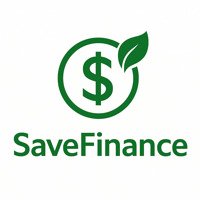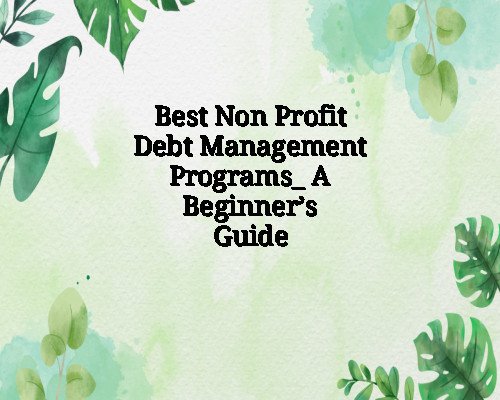Best Non-Profit Debt Management Programs: A Beginner’s Guide
Are you struggling to manage your debts? Non-profit debt management programs could be the solution you’re looking for. These programs offer a way to regain control of your finances, lower your interest rates, and make your monthly payments more manageable. This beginner’s guide will walk you through everything you need to know about non-profit debt management programs and how they can help you become debt-free.
What is a Non-Profit Debt Management Program?
A non-profit debt management program (DMP) is an organized, structured approach to help individuals pay off their unsecured debts, such as credit cards, medical bills, and personal loans. These programs are typically offered by non-profit credit counseling agencies that provide financial education, budget counseling, and debt repayment plans. The goal is to make debt repayment easier by consolidating your payments and negotiating better terms with your creditors.
How Do Non-Profit Debt Management Programs Work?
A non-profit debt management program works by helping you consolidate multiple debts into a single monthly payment. Here’s a step-by-step breakdown of how these programs typically work:
-
Consultation with a Credit Counselor: The first step is to schedule a free consultation with a certified credit counselor. During this session, the counselor will review your financial situation, including your income, expenses, and debts. They will also assess your financial goals and help you determine if a DMP is right for you.
-
Creating a Debt Repayment Plan: If a DMP is suitable for your situation, the credit counselor will work with you to create a customized debt repayment plan. This plan will outline how much you need to pay each month and the duration it will take to pay off your debts.
-
Negotiating with Creditors: Once your DMP is in place, the credit counseling agency will contact your creditors to negotiate lower interest rates and, in some cases, reduce or eliminate late fees and penalties. This can help you save money and pay off your debts faster.
-
Making Payments: Instead of making multiple payments to different creditors, you’ll make a single payment to the credit counseling agency. The agency will then distribute the payment to your creditors according to the agreed-upon terms.
-
Ongoing Support: Throughout the process, the credit counseling agency will provide ongoing support to help you stay on track with your payments. They may also offer financial education and resources to help you manage your money more effectively.
The Benefits of Non-Profit Debt Management Programs
Non-profit debt management programs offer several advantages that can make it easier to get out of debt. Here are some key benefits:
-
Lower Interest Rates: One of the biggest advantages of a DMP is the potential to secure lower interest rates on your debts. This can help you save money in the long run and pay off your debts more quickly.
-
Consolidated Payments: Instead of keeping track of multiple payments to different creditors, a DMP consolidates your debts into one easy-to-manage monthly payment. This can make it simpler to stay organized and avoid missing payments.
-
Reduced Stress: Managing multiple debts can be overwhelming and stressful. A DMP can take the pressure off by handling negotiations and offering you a clear path to becoming debt-free.
-
Improved Credit Score: While participating in a DMP may initially cause a temporary dip in your credit score, making regular, on-time payments can help improve your credit score over time. Additionally, successfully completing the program will show potential creditors that you’re committed to paying off your debts.
-
Access to Financial Education: Non-profit debt management programs often include financial counseling and education. This can help you learn how to budget, save, and avoid falling into debt again in the future.
Types of Non-Profit Debt Management Programs
Non-profit debt management programs come in different forms to meet the needs of various individuals. Here are some common types of programs you may encounter:
-
Credit Counseling: Credit counseling is typically the first step in a debt management program. It involves speaking with a certified credit counselor who will help you assess your financial situation, create a budget, and explore debt repayment options.
-
Debt Management Plans (DMPs): This is the most common type of non-profit debt management program. A DMP consolidates your unsecured debts into one monthly payment, with the counselor negotiating lower interest rates and other favorable terms with your creditors.
-
Debt Settlement Programs: While not always offered by non-profit agencies, some credit counseling organizations may assist with debt settlement. This involves negotiating with creditors to reduce the total amount of debt owed, typically by offering a lump-sum payment. However, debt settlement can negatively impact your credit score, so it’s usually a last resort.
-
Bankruptcy Counseling and Education: If you’re considering bankruptcy as an option, many non-profit credit counseling agencies provide mandatory pre-bankruptcy counseling and education courses. These services can help you understand the bankruptcy process and explore alternatives.
Choosing the Right Non-Profit Debt Management Program
When selecting a non-profit debt management program, it’s important to consider several factors to ensure you’re choosing the right one for your needs:
-
Accreditation and Certification: Make sure the credit counseling agency is accredited by a reputable organization, such as the National Foundation for Credit Counseling (NFCC) or the Financial Counseling Association of America (FCAA). These accreditations ensure the agency meets industry standards and follows ethical practices.
-
Fees: While non-profit agencies are generally free or low-cost, some may charge fees for certain services. Always inquire about fees upfront, and make sure they are reasonable and transparent.
-
Reputation: Research the agency’s reputation by reading reviews and checking with organizations like the Better Business Bureau (BBB) to ensure they have a positive track record of helping people with debt.
-
Customer Support: A good credit counseling agency will offer ongoing support and counseling to help you stay on track. Make sure the agency provides access to resources, support, and educational materials that can help you manage your finances long-term.
-
Program Flexibility: Debt management programs are not one-size-fits-all. The agency should offer a personalized approach to meet your specific financial situation and goals.
Common Misconceptions About Non-Profit Debt Management Programs
While non-profit debt management programs can be incredibly helpful, there are a few common misconceptions that might make people hesitant to seek assistance:
-
They Only Help with Credit Card Debt: While credit card debt is the most common type of debt addressed by DMPs, these programs can also help with medical bills, personal loans, and even some types of student loan debt.
-
Debt Management Programs Are the Same as Debt Settlement: Debt management programs focus on working with creditors to reduce interest rates and make debt payments more manageable, while debt settlement involves negotiating a reduction in the overall amount owed. Debt settlement can harm your credit, while debt management programs typically help improve your credit over time.
-
Non-Profit Agencies Aren’t Legitimate: Many people assume that non-profit agencies are ineffective or lack credibility. However, reputable non-profit credit counseling agencies are held to high standards and can be an excellent resource for managing debt.
-
Debt Management Programs Are Expensive: While some credit counseling agencies may charge fees, they are generally much more affordable than for-profit companies. Many agencies also offer free consultations and low-cost services.
How to Get Started with a Non-Profit Debt Management Program
If you’re ready to take control of your debt, here’s how to get started with a non-profit debt management program:
-
Research Accredited Agencies: Start by researching accredited non-profit credit counseling agencies in your area or online. Check for certifications from organizations like the NFCC or FCAA.
-
Schedule a Free Consultation: Contact the agency to schedule a free consultation. During the consultation, be prepared to provide information about your income, expenses, and debts.
-
Create a Plan: If the program is right for you, the credit counselor will work with you to create a personalized debt repayment plan that fits your budget and financial goals.
-
Stick to the Plan: Once your DMP is in place, make sure to stick to the plan and make your payments on time. Stay in touch with the agency if you experience any difficulties or need additional support.
Conclusion
Non-profit debt management programs offer a valuable solution for individuals struggling with debt. By consolidating your payments, lowering interest rates, and providing financial education, these programs can help you regain control of your finances and work towards a debt-free future. Take the first step today by finding an accredited, reputable credit counseling agency and exploring the options available to you.

